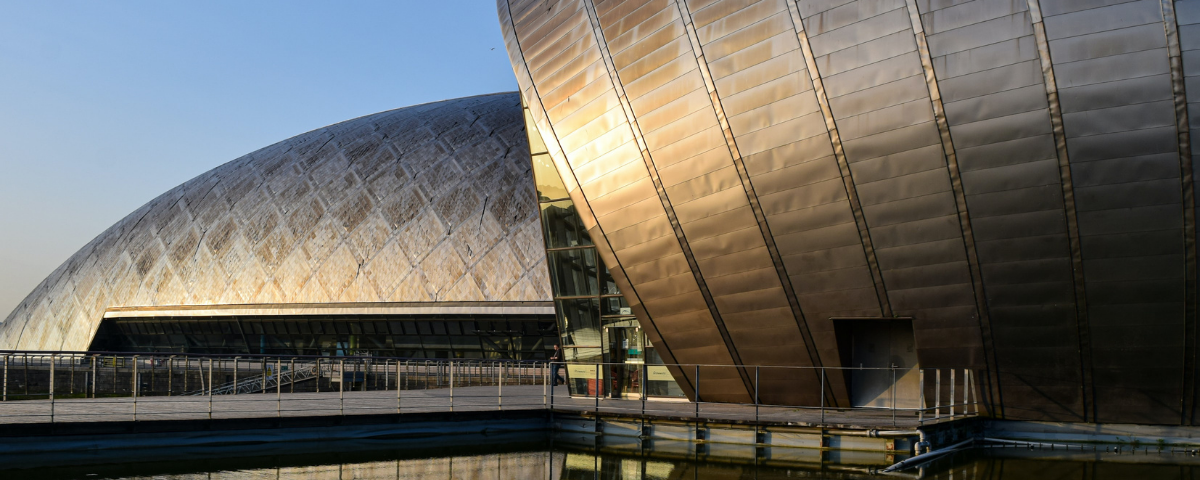In a fascinating session that took place on day one at IBTM World 2021, a panel shared insights into the delivery of the COP26 UN Climate Change Conference, which took place in Glasgow from 31st October to 12th November 2021.
The session was presented by: Laura Lopez, Director, Conference Affairs, United Nations Framework Convention on Climate Change (UNFCCC); Neil Brownlee, Head of Business Events, VisitScotland; Kathleen Warden, Director of Conference Sales, Scottish Event Campus (SEC); and moderated by Rory Archibald, Associations, Sectors & Marketing, VisitScotland.
Talking about planning COP26, Laura Lopez shared that “the highlight for me was the way the National and Scottish health authorities put in place protocols that allowed us to put in place 38,000 registered and badge attendees with less than 100 covid cases.” An impressive feat given the impact of coronavirus.
The evolving pandemic had significant impacts on planning. Laura shared that: “Early on during the pandemic, the UK government was concerned that no one would be able to come to the event, and as things continued to evolve, it was difficult to know what we were planning for. By the time we got to the summer, we were very concerned, then in September things picked up and we were getting upwards of three to four thousand registrations per day. By the time COP26 opened we had 58 thousand people registered and we actually started to panic, as we knew we couldn’t accommodate that many!”
Continuing on the theme of the challenges faced in planning such a significant event, Laura explained that usually 75% of those who have registered pick up badges, so even taking that into account, the team was still concerned that the wonderful venue wasn’t enough. “We then started explaining physical distancing in the rooms and that people needed to plan accordingly as we had to balance making it available to as many as possible but then not discouraging people from coming.”
Other challenges included agreeing and implementing covid measures. The team planned very responsible measures but also wanted to ensure they didn’t want to scare people off. Also, they had to bear in mind that some delegates would be coming from very challenged countries and might not have, for example, a mobile phone and so how can they then upload test results. “We had to make many amends to accommodate that type of thing which was a big challenge”, said Laura.
Kathleen discussed the benefits to Glasgow, and the SEC of hosting such a globally important event. “The pandemic had drawn a line on the desperate need to tackle climate change and it was all very fresh in our minds, so to be the host venue at that point was an astonishing privilege. Glasgow was the proud seat of the industrial revolution, and then to then be the city that hosted this event, focusing on undoing some of the impacts of the industrial revolution was really rather poignant.
“Beyond that as a venue, the visibility that we obviously had on a global media stage was a dream, no question about that. It was an incredible endorsement of us as a venue and of Glasgow as a destination that the UK government selected us. On a personal level, it was a sheer joy to see people back at an event, and teams being back doing what they love doing.”
Talking about how the legacy of COP26 is being used to position Scotland as a sustainable event destination and what the industry can take from the event, Neil commented “The industry shouldn’t beat itself up too much, as our sector has been doing a lot for years towards being more sustainable. I think large events should act as a demonstration to smaller ones of what can be done. Event organisers need to build sustainable practices into the way we work, for example recycling carpets and reducing food miles. Scotland, for example, has placed great focus on using local produce for years now. What COP26 can do is help galvanise people to ensure these shifts become permanent and take them to the next level.”
Kathleen added that “I do think as an industry we’ve been paying attention to the challenge. We do though have a huge amount to do. Some of it is within our control, some of it is within the control of our partners – airlines etc., but there is a huge amount of collaboration that is required.”
Neil commented that “I spend 90% of my day job trying to position business events as more important than sporting and cultural events that we keep being told are transformational. I was very clear to point out that COP26 is a business event! Legacy is key – every single business event that takes place in Scotland and across the globe should be nudging forward some sort of economic, societal or cultural issue that needs to be addressed. As an industry, we should ensure that every event around the world is a ‘mini COP’ – that there are discussions, experts, outcomes and a legacy. That’s the power of business events – to create change and make the world a better place. That’s what we need to harness out of COP26.”

